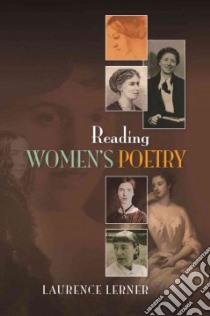- Libreria
- >
- Libri in lingua
- >
Reading Women's Poetry - 9781845193348
Un libro in lingua di Laurence Lerner edito da Intl Specialized Book Service Inc, 2009
- € 22.30
- Il prezzo è variabile in funzione del cambio della valuta d’origine
Until quite recently, anthologies of English poetry contained very few poems by women, and histories of English poetry gave little space to women poets. How should poetry lovers respond? This book begins by suggesting four possible responses: (a) the conservative, which claims that women have not written many good poems; (b) the individual recuperation, which salvages some fine poems by women but without altering the general view of English poetry; (c) the alternative canon, which claims that women do not write the same kind of poetry as men, so that their work should be judged by different standards; and (d) the cultural recuperation, which claims that women's poetry is a significant cultural phenomenon, and should be read and studied without subjecting it to any tests. All these positions can be defended and Reading Women's Poetry has elements of them all. As the title indicates, this book is about reading women's poems, rather than forming theories about them. It explores the experience of reading the poetry of Aphra Behn, Elizabeth Browning, Christina Rossetti, Emily Dickinson, and many others. Beginning with Katherine Philips, the first Englishwoman to achieve fame as a poet, the book covers three centuries to the work of Marianne Moore and Stevie Smith. The form of discussion of the selected poems will be helpful in engaging further with women poets of all calibers. Do women write differently from men? The author compares poems written by women with poems by men, not so much to ask who writes better poetry as to explore the similarities and differences. Thus, Lady Mary Wortley Montagu is discussed along with Alexander Pope, Emily Dickinson along with Gerard Manly Hopkins, and Elizabeth Browning along with her husband. Poems by women should be read, enjoyed, and argued about. They can be related to the time they were written and first admired, or to our views on women's history, or to our expectations of what poetry can offer. Above all, they should be enjoyed. And that is the faith in which this book is written.
Informazioni bibliografiche
- Titolo del Libro in lingua: Reading Women's Poetry
- Lingua: English
- Autore: Laurence Lerner
- Editore: Intl Specialized Book Service Inc
- Collana: (Paperback)
- Data di Pubblicazione: 15 Gennaio '09
- Genere: LITERARY CRITICISM
- Argomenti : English poetry Women authors History and criticism American poetry Women authors History and criticism Poetry Authorship Sex differences
- Pagine: 194
- Dimensioni mm: 222 x 146 x 6
- ISBN-10: 1845193342
- EAN-13: 9781845193348


